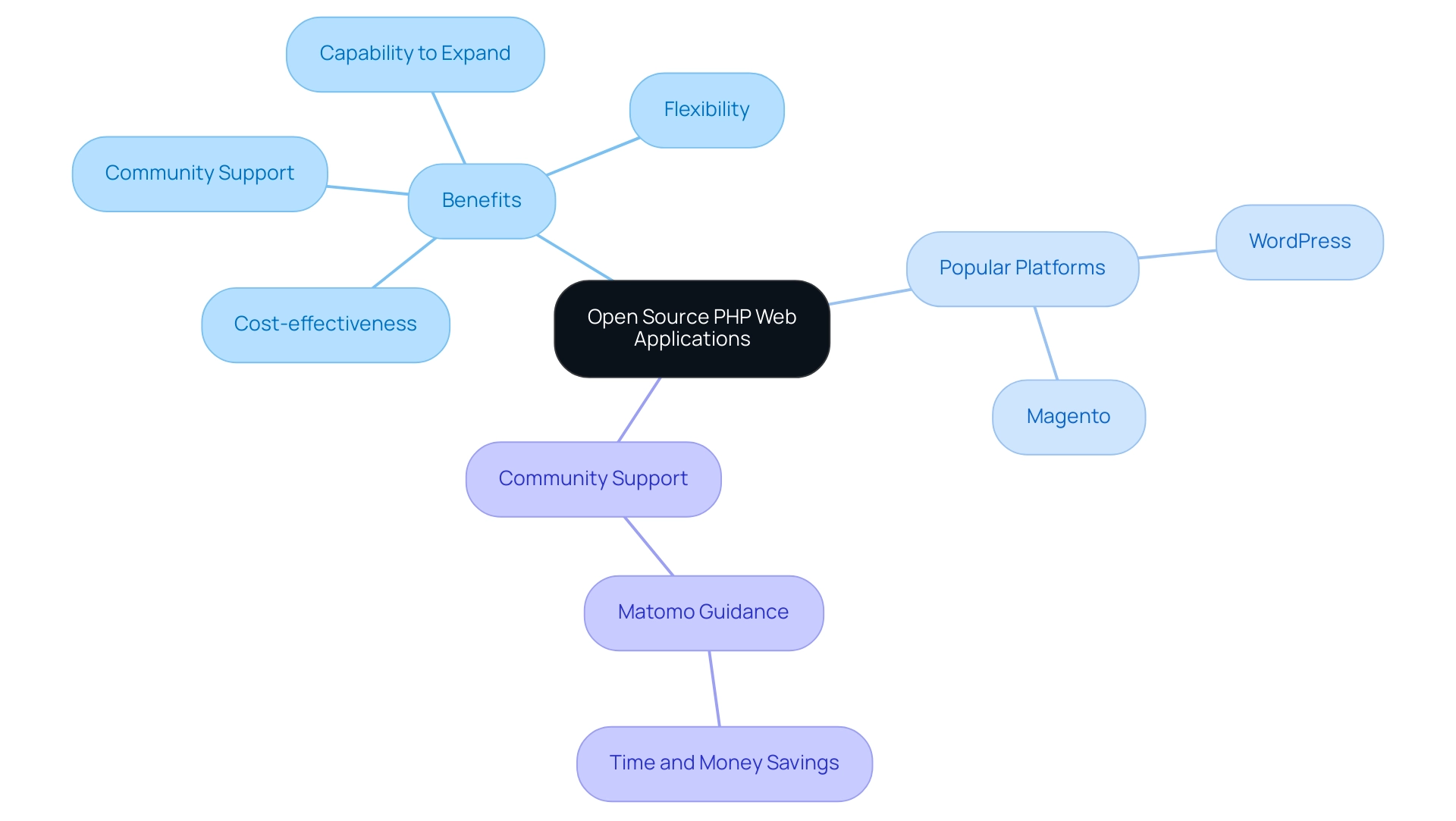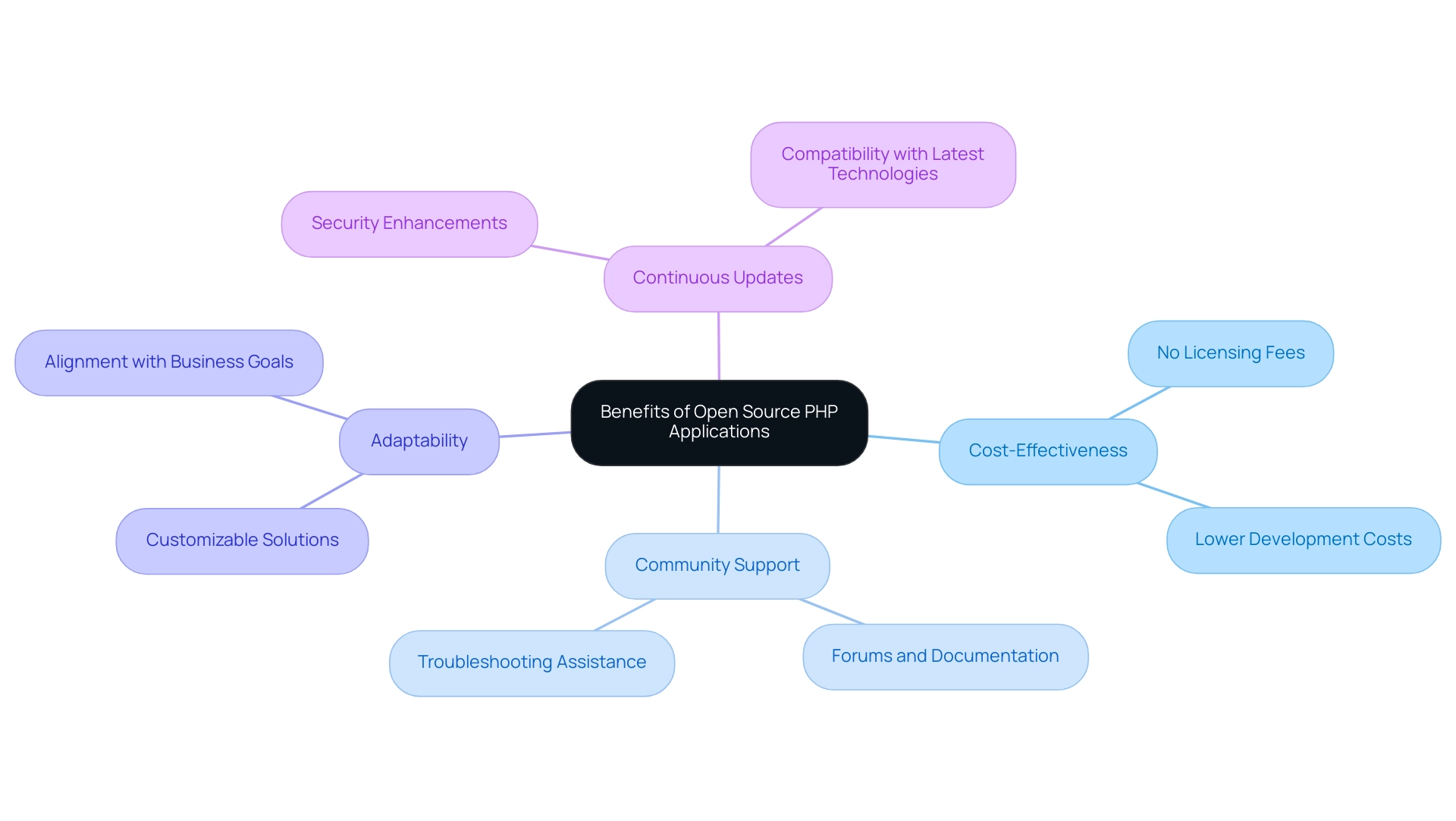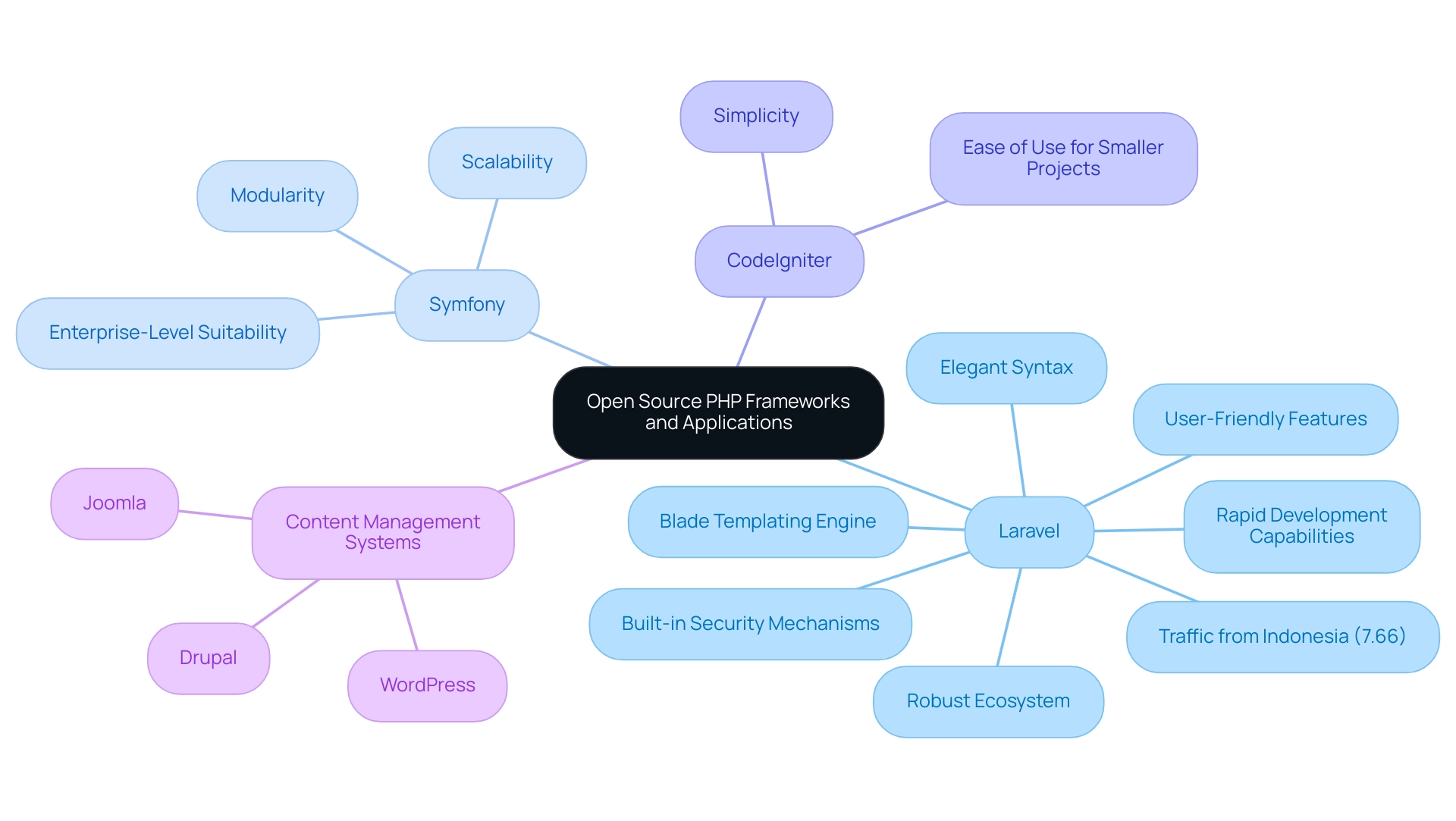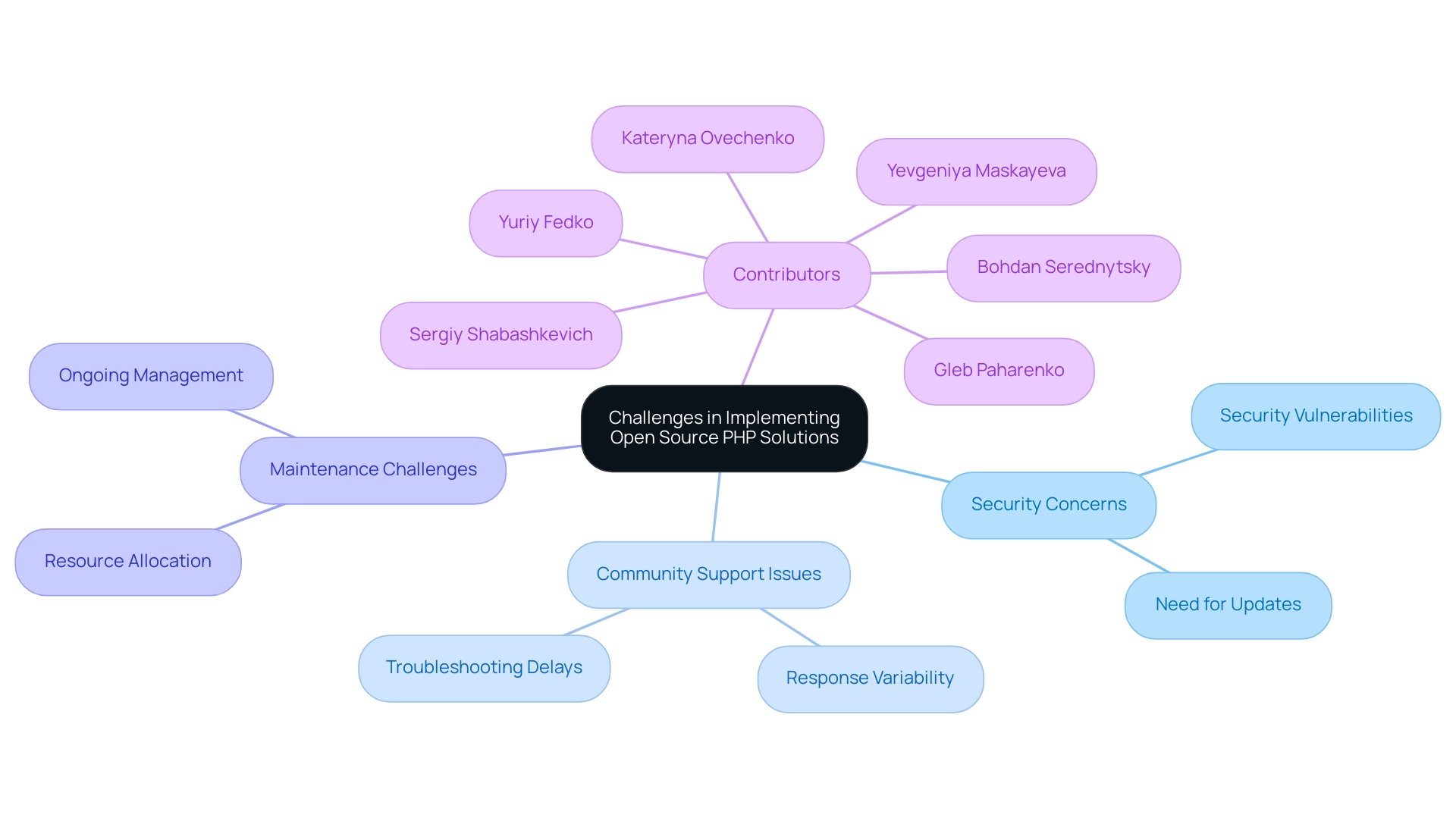Introduction
In the ever-evolving digital landscape, open source PHP web applications have emerged as a cornerstone of modern development, empowering businesses with flexibility, cost-effectiveness, and community-driven innovation. As these applications power approximately 78% of websites today, their significance cannot be overstated. From enhancing content management through platforms like WordPress to revolutionizing e-commerce with solutions like Magento, open source PHP applications are transforming how organizations engage with their audiences.
However, while the benefits are compelling, the journey to successful implementation is not without its challenges. This article delves into the defining characteristics of open source PHP applications, explores their myriad benefits, highlights popular frameworks, and addresses the potential hurdles developers face in this dynamic environment. Understanding these facets is crucial for businesses aiming to harness the full potential of open source solutions in achieving their strategic goals.
Defining Open Source PHP Web Applications
Open source PHP web applications signify a dynamic part of the software landscape, created using the PHP programming language and made freely available to the public. This collaborative development model enables developers globally to view, modify, and distribute the code, significantly enhancing innovation and accelerating the pace of development. As of 2024, roughly 78% of websites employ free PHP software, highlighting their crucial role in the digital ecosystem.
Notably, popular platforms such as WordPress and Magento exemplify the transformative impact of these applications on content management and e-commerce, enhancing retention rates and boosting Average Order Value (AOV). Our tailored e-commerce solutions are designed to complement these platforms, helping organizations build community value and generate incremental revenue. With a proven track record of improving critical KPIs, our solutions have consistently increased AOV and Lifetime Value (LTV) for clients across various industries.
According to Matomo, an analytics platform designed for public environments, 'Matomo specialists will save you time and money by offering advice on how best to utilize your Matomo.' This emphasizes how professional assistance can aid users in maximizing the potential of their accessible tools. Moreover, the case analysis of a user moving from AWStats, a free analytics program, to Google Analytics because of its connection with Google AdWords demonstrates the efficiency of alternative solutions, despite AWStats being commended for its features.
This discussion summarizes the overarching advantages of open source PHP web applications in terms of accessible PHP development:
- Cost-effectiveness
- Community support
- Flexibility to tailor solutions according to specific user needs
- Capability to expand these platforms to satisfy specific requirements while aligning with your internal objectives and KPIs
Our specialized assistance further amplifies these benefits by guaranteeing that customized solutions effectively meet user requirements and optimize the value obtained from these open access programs.

Benefits of Open Source PHP Applications
The remarkable advantages of cost-effectiveness are particularly evident in open source PHP web applications. Typically available at no charge, open source PHP web applications can significantly lower development costs, making them an attractive option for businesses. Furthermore, the extensive community support surrounding open source PHP web applications provides developers with valuable resources, including forums, documentation, and troubleshooting assistance.
This collaborative environment fosters innovation and problem-solving, enhancing the overall user experience. Adaptability is another essential advantage; companies can modify open source PHP web applications to create customized solutions that closely match their goals. The open source PHP web applications model also guarantees continuous updates and improvements, ensuring that these applications remain secure and compatible with the latest technologies.
As noted by Christian Kemptner, Marketing & Partners Manager at Pimcore, "Matomo and Pimcore share a similar philosophy. Both are based on the doctrine that intellectual property such as software should be available to enterprises for free without having to pay any licensing cost. Both give companies full ownership and control of all data they collect and store."
This philosophy is further exemplified by Matomo, which is used by more than 1,000,000 websites worldwide, enhancing reporting capabilities and user experience. Additionally, our tailored e-commerce solutions have demonstrated significant improvements in key performance indicators (KPIs) such as retention rates, Average Order Value (AOV), and Lifetime Value (LTV). By leveraging over 20 years of global experience, we employ proven methodologies that not only reshape industries but also enhance community engagement and directly contribute to revenue generation, delivering unparalleled value to our clients.

Popular Open Source PHP Frameworks and Applications
The landscape of open source PHP web applications is dominated by frameworks like Laravel, Symfony, and CodeIgniter, each tailored to meet diverse development needs. Laravel stands out with its elegant syntax, robust ecosystem, and features like the Blade templating engine, making it the framework of choice for contemporary web projects. Aijaz Mughal notes,
In the last decade, a modest yet productive and efficient open-source PHP framework has emerged as a giant entity within the global programming landscape.
This sentiment is reflected in Laravel's increasing traction, evidenced by the impressive 7.66% of traffic directed to laravel.com from Indonesia alone. Laravel's user-friendly features, rapid development capabilities, and built-in security mechanisms further contribute to its popularity among developers. In contrast, Symfony excels in modularity and scalability, making it particularly suitable for complex enterprise-level projects.
CodeIgniter, while less prominent, offers simplicity and ease of use for smaller projects. Furthermore, platforms like WordPress, Joomla, and Drupal enhance the ecosystem by providing powerful content management capabilities, allowing users to efficiently create and manage websites. A case study titled 'Final Word on Laravel's Growth' highlights Laravel's emergence as a significant player in the global programming landscape, reinforcing the expectation that its popularity will continue to rise as more developers enter the industry and contribute to its ecosystem.
Collectively, these frameworks and tools illustrate the vibrant and expanding world of open source PHP web applications available to developers.

Challenges in Implementing Open Source PHP Solutions
While open source PHP web applications offer numerous benefits, they also bring considerable obstacles that developers must manage. Security ranks as a primary concern, with numerous public projects vulnerable to weaknesses if not carefully maintained. In 2024, the environment of security vulnerabilities in public PHP software continues to evolve, requiring developers to stay proactive in applying updates quickly to reduce risks.
While recent reports indicate that 31 of the scanned public web tools were developed using ASP/ASP.NET, this statistic emphasizes the significance of understanding the security concerns related to various development environments, including PHP, which similarly encounter vulnerabilities if not properly managed.
Moreover, reliance on community support can lead to unpredictable delays in troubleshooting. The variability in response times and the quality of assistance can hinder project timelines, making it crucial for businesses to prepare for such eventualities. Maintenance, too, poses a significant hurdle, as organizations must allocate resources effectively to ensure their applications not only function optimally but also keep pace with security updates and feature enhancements.
Expert insights emphasize the significance of upkeep in publicly available software. Cristian Borghello emphasizes, "Consistent oversight is essential to safeguard against emerging threats," highlighting the critical nature of ongoing management. Case studies, such as the OWASP Top 10 2013 document translation into Ukrainian, illustrate collaborative efforts to address security and accessibility in the community.
Contributors like Kateryna Ovechenko, Yuriy Fedko, Gleb Paharenko, Yevgeniya Maskayeva, Sergiy Shabashkevich, and Bohdan Serednytsky played vital roles in this endeavor, which culminated in a published PDF format, showcasing the community's commitment to vigilance and proactive management. This ongoing dedication is vital for businesses looking to successfully implement open source PHP solutions.

Conclusion
Open source PHP web applications play an indispensable role in the current digital landscape, providing businesses with the flexibility, cost-effectiveness, and community-driven innovation necessary for success. The defining characteristics of these applications, such as their collaborative nature and extensive support, empower organizations to customize solutions that align with their specific goals. As evidenced by the widespread adoption of platforms like WordPress and Magento, these applications enhance user engagement and drive significant improvements in key performance indicators.
While the benefits of open source PHP applications are compelling, it is essential to acknowledge the challenges that accompany their implementation. Key challenges include:
- Security vulnerabilities
- Reliance on community support
- The need for ongoing maintenance
These challenges require developers to adopt a proactive approach. Companies must prioritize consistent oversight and resource allocation to ensure that their applications remain secure and up-to-date, thereby fully harnessing the potential of open source solutions.
By navigating these challenges and leveraging the advantages offered by open source PHP applications, organizations can not only streamline their operations but also foster innovation and growth. The journey towards successful implementation may be complex, but the rewards—enhanced engagement, increased revenue, and a competitive edge—are well worth the effort. Embracing open source solutions is not just a strategic choice; it is a vital step towards thriving in an increasingly digital world.





